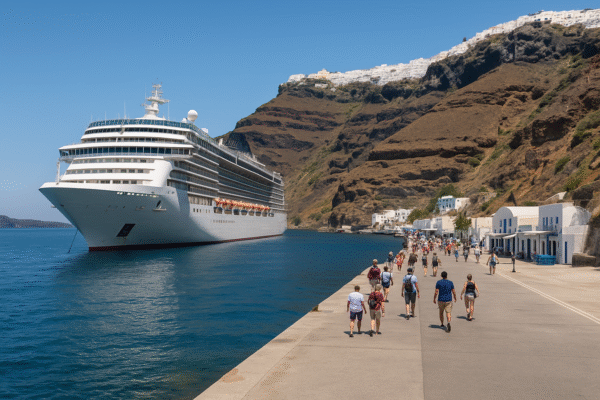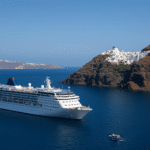In a sweeping move to curb the impacts of mass cruise tourism, Greece, Italy, and Mexico have each introduced disembarkation fees for cruise passengers arriving at their ports. This policy shift reflects growing global concern over overtourism and its strain on infrastructure, heritage sites, and local communities.
Greece’s Cruise Fee Strategy: Preserving Island Life
Greece, a top destination for cruise ships in the Eastern Mediterranean, has seen record-setting tourism volumes. In 2023 alone, the Hellenic Ports Association reported over 7.9 million cruise passengers—a 13% increase from 2022. The country’s iconic islands such as Santorini and Mykonos have experienced mounting pressure on their roads, waste systems, and public services, particularly during the summer peak.
To manage this surge, the Greek Ministry of Tourism has introduced mandatory disembarkation fees at select ports. These fees aim to:
- Fund local infrastructure upgrades, especially at smaller ports ill-equipped for daily cruise crowds
- Support environmental preservation and waste management efforts
- Provide revenue streams for cultural site restoration and tourism workforce training
Cruise ships docking at Santorini, for example, frequently unload thousands of passengers in a single day, overwhelming the narrow lanes of Fira and Oia. The new fee structure is intended to limit congestion while enhancing the quality of the tourist experience.
“Visitors will still be welcome, but we must prioritize balance between tourism growth and community wellbeing,” said a spokesperson from the Greek Ministry of Tourism.
Italy’s Venice Sets an Overtourism Example
Italy’s UNESCO World Heritage city of Venice has taken global headlines by introducing a €5–€10 disembarkation fee for cruise passengers and day-trippers not staying overnight. The fee, introduced after years of warnings from UNESCO and local protests, is a direct response to the damage cruise tourism has caused to the city’s fragile lagoon ecosystem and infrastructure.
According to Venice’s local council, the city will limit daily cruise passenger entries and use the collected funds to enhance public transport, pedestrian pathways, and heritage conservation efforts.
Rome has supported this initiative, viewing Venice as a testing ground for other Italian coastal cities like Naples, Livorno, and Genoa, where overtourism is also rising.
Mexico Follows with Caribbean Cruise Tax
Across the Atlantic, Mexico—home to some of the busiest cruise ports in the world like Cozumel and Progreso—has also begun enforcing a new $5 disembarkation fee (USD 5.86) for cruise tourists. According to Mexico’s Ministry of Tourism (SECTUR), this fee is expected to rise incrementally, reaching $21 (USD 24.62) per passenger by 2028.
The fee aims to:
- Improve coastal city infrastructure strained by daily ship arrivals
- Support reef conservation and marine park maintenance
- Empower local communities and artisans through tourism grants
Cozumel alone receives more than 3 million cruise visitors annually. Without new regulations, the island faces severe degradation of coral reefs and urban stress.
SECTUR’s Secretary Miguel Torruco has emphasized that “responsible tourism is no longer optional. It is a necessary transition.”
Cruise Industry Reaction: Adapting to Change
Cruise lines have yet to announce standardized payment processes for the new fees. Whether passengers will pay the disembarkation fee directly at ports, include it in their ticket prices, or be billed by cruise operators remains unclear. The Cruise Lines International Association (CLIA) is reportedly in ongoing discussions with local governments to define clear guidelines.
While additional costs may be met with resistance by some travelers, demand for Mediterranean and Caribbean cruises remains strong, suggesting that price sensitivity may not deter most tourists. Instead, cruise lines may adapt by offering smaller group excursions, partnering with eco-certified tour providers, or adjusting itineraries to reduce port frequency.
A Global Trend Toward Sustainable Tourism Financing
Greece, Italy, and Mexico are not alone in this shift. Other countries such as Norway, Iceland, and the Netherlands are also exploring cruise visitor taxes to control tourist volume and maintain quality of life for residents. This growing trend aligns with UNWTO (United Nations World Tourism Organization) guidelines encouraging destination-level visitor management strategies.
According to the European Commission, the cruise industry contributes over €15 billion to the EU economy but comes with high environmental and urban costs. Cruise-related emissions, waste disposal issues, and heritage site erosion are prompting cities to rethink how cruise tourism is monetized and managed.
Long-Term Vision: Quality Over Quantity
These newly implemented disembarkation fees represent a clear message from destination governments: mass tourism must be balanced with preservation. Rather than banning cruise ships outright, cities are pursuing financial tools to help absorb the costs of tourism while incentivizing more sustainable visitor behavior.
For travelers, these changes may mean slightly higher costs—but also cleaner cities, more organized port experiences, and improved services.
Ultimately, the move by Greece, Italy, and Mexico could set a global precedent for cruise port cities grappling with overtourism. If successful, it may encourage a new era of cruise tourism that is both economically beneficial and environmentally conscious, preserving the world’s most beloved destinations for generations to come.
For more travel news like this, keep reading Global Travel Wire
















